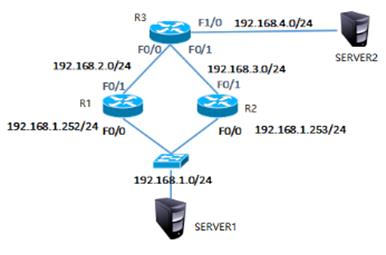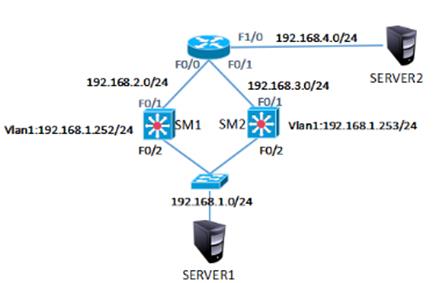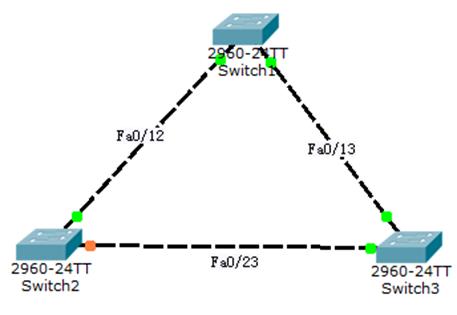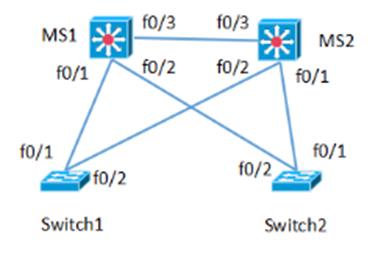cisco Switching-三层交换配置RIP动态路由
Posted
tags:
篇首语:本文由小常识网(cha138.com)小编为大家整理,主要介绍了cisco Switching-三层交换配置RIP动态路由相关的知识,希望对你有一定的参考价值。
参考技术A 在三层交换机上配置RIP路由协议,以三层交换机代替路由器。通过RIP实现路由间通信
动态路由协议配置灵活,路由器会发送自身的路由信息给其他路由器,同时也会接收其他路由器发来的路由信息建立自己的路由表。这样在路由器上就不必像静态路由那样为每个目标地址都配置路由,因为路由器可以通过协议学习这些路由。网络拓扑改变,路由信息也会自动更新,无需管理员干预。
Switch(config)#interface f0/6
Switch(config-if)#no switchport
Switch(config-if)#ip address 192.168.6.1 255.255.255.0
Switch(config-if)#no shutdown
RIP路由协议在配置network时,只需要配置该路由器所直连的主类网络,不与该路由器直连的网络不需要包含在network中。
RIP默认工作在第一版本下,但是RIP-V1是有类路由协议,而且通过广播的方式进行路由更新,无论是功能上还是效率上都有一些缺陷,这些缺陷RIP-V2可以弥补。在使用时建议采用RIP-V2而不是RIP-V1。
tarenasw-3L(config)#router rip
tarenasw-3L(config-router)#version 2
tarenasw-3L(config-router)#no auto-summary
tarenasw-3L(config-router)#network 192.168.1.0
tarenasw-3L(config-router)#network 192.168.2.0
tarenasw-3L(config-router)#network 192.168.3.0
tarenasw-3L(config-router)#network 192.168.4.0
tarenasw-3L(config-router)#network 192.168.5.0
tarenasw-3L(config-router)#network 192.168.6.0
tarena-router(config)#router rip
tarena-router(config-router)#version 2
tarenasw-3L(config-router)#no auto-summary
tarena-router(config-router)#network 192.168.6.0
tarena-router(config-router)#network 192.168.7.0
注意以R开头的路由,这些路由表示通过RIP协议从其他运行RIP的路由器学习过来的路由。每条路由都写明了目标网络、下一跳IP地址以及从自己哪个端口发出去。
tarenasw-3L#show ip route
Codes: C - connected, S - static, I - IGRP, R - RIP, M - mobile, B - BGP
D - EIGRP, EX - EIGRP external, O - OSPF, IA - OSPF inter area
N1 - OSPF NSSA external type 1, N2 - OSPF NSSA external type 2
E1 - OSPF external type 1, E2 - OSPF external type 2, E - EGP
i - IS-IS, L1 - IS-IS level-1, L2 - IS-IS level-2, ia - IS-IS inter area
* - candidate default, U - per-user static route, o - ODR
P - periodic downloaded static route
Gateway of last resort is not set
C 192.168.1.0/24 is directly connected, Vlan1
C 192.168.2.0/24 is directly connected, Vlan2
C 192.168.3.0/24 is directly connected, Vlan3
C 192.168.4.0/24 is directly connected, Vlan4
C 192.168.5.0/24 is directly connected, Vlan5
C 192.168.6.0/24 is directly connected, FastEthernet0/6
R 192.168.7.0/24 [120/1] via 192.168.6.2, 00:00:12, FastEthernet0/6 0
Router#show ip route
Codes: C - connected, S - static, I - IGRP, R - RIP, M - mobile, B - BGP
D - EIGRP, EX - EIGRP external, O - OSPF, IA - OSPF inter area
N1 - OSPF NSSA external type 1, N2 - OSPF NSSA external type 2
E1 - OSPF external type 1, E2 - OSPF external type 2, E - EGP
i - IS-IS, L1 - IS-IS level-1, L2 - IS-IS level-2, ia - IS-IS inter area
* - candidate default, U - per-user static route, o - ODR
P - periodic downloaded static route
Gateway of last resort is not set
R 192.168.1.0/24 [120/1] via 192.168.6.1, 00:00:25, FastEthernet0/0
R 192.168.2.0/24 [120/1] via 192.168.6.1, 00:00:25, FastEthernet0/0
R 192.168.3.0/24 [120/1] via 192.168.6.1, 00:00:25, FastEthernet0/0
R 192.168.4.0/24 [120/1] via 192.168.6.1, 00:00:25, FastEthernet0/0
R 192.168.5.0/24 [120/1] via 192.168.6.1, 00:00:25, FastEthernet0/0
C 192.168.6.0/24 is directly connected, FastEthernet0/0
C 192.168.7.0/24 is directly connected, FastEthernet0/1
5.在PC上测试到五个VLAN中主机的通信
PC>ipconfig
FastEthernet0 Connection:(default port)
Link-local IPv6 Address.........: FE80::2E0:8FFF:FE14:BB43
IP Address......................: 192.168.7.1
Subnet Mask.....................: 255.255.255.0
Default Gateway.................: 192.168.7.254
SERVER>ping 192.168.1.10
Pinging 192.168.1.10 with 32 bytes of data:
Reply from 192.168.1.1: bytes=32 time=0ms TTL=126
Reply from 192.168.1.1: bytes=32 time=0ms TTL=126
Reply from 192.168.1.1: bytes=32 time=0ms TTL=126
Reply from 192.168.1.1: bytes=32 time=1ms TTL=126
Ping statistics for 192.168.1.1:
Packets: Sent = 4, Received = 3, Lost = 1 (25% loss),
Approximate round trip times in milli-seconds:
Minimum = 0ms, Maximum = 1ms, Average = 0ms
PC >ping 192.168.2.1
Pinging 192.168.2.10 with 32 bytes of data:
Reply from 192.168.2.1: bytes=32 time=0ms TTL=126
Reply from 192.168.2.1: bytes=32 time=0ms TTL=126
Reply from 192.168.2.1: bytes=32 time=0ms TTL=126
Reply from 192.168.2.1: bytes=32 time=0ms TTL=126
Ping statistics for 192.168.2.1:
Packets: Sent = 4, Received = 4, Lost = 0 (0% loss),
Approximate round trip times in milli-seconds:
Minimum = 0ms, Maximum = 0ms, Average = 0ms
PC >ping 192.168.3.1
Pinging 192.168.3.10 with 32 bytes of data:
Reply from 192.168.3.1: bytes=32 time=1ms TTL=126
Reply from 192.168.3.1: bytes=32 time=0ms TTL=126
Reply from 192.168.3.1: bytes=32 time=0ms TTL=126
Reply from 192.168.3.1: bytes=32 time=0ms TTL=126
Ping statistics for 192.168.3.1:
Packets: Sent = 4, Received = 4, Lost = 0 (0% loss),
Approximate round trip times in milli-seconds:
Minimum = 0ms, Maximum = 1ms, Average = 0ms
PC >
31% /misc/nfsdir SERVER>
SERVER>ping 192.168.3.10
Pinging 192.168.3.10 with 32 bytes of data:
Reply from 192.168.4.1: bytes=32 time=1ms TTL=126
Reply from 192.168.4.1: bytes=32 time=0ms TTL=126
Reply from 192.168.4.1: bytes=32 time=0ms TTL=126
Reply from 192.168.4.1: bytes=32 time=0ms TTL=126
Ping statistics for 192.168.4.1:
Packets: Sent = 4, Received = 4, Lost = 0 (0% loss),
Approximate round trip times in milli-seconds:
Minimum = 0ms, Maximum = 1ms, Average = 0ms
31% /misc/nfsdir
SERVER>ping 192.168.5.1
Pinging 192.168.5.1 with 32 bytes of data:
Reply from 192.168.5.1: bytes=32 time=1ms TTL=126
Reply from 192.168.5.1: bytes=32 time=0ms TTL=126
Reply from 192.168.5.1: bytes=32 time=0ms TTL=126
Reply from 192.168.5.1: bytes=32 time=0ms TTL=126
Ping statistics for 192.168.5.1:
Packets: Sent = 4, Received = 4, Lost = 0 (0% loss),
Approximate round trip times in milli-seconds:
Minimum = 0ms, Maximum = 1ms, Average = 0ms
31% /misc/nfsdir
Cisco基础:HSRP配置三层交换配置HSRPSTP的配置三层交换配置STP
一、HSRP配置
目标:
在企业网络到外部的连接方案中,要求不高的条件下可以是单出口。一旦该出口线路出现问题,整个企业网络就不能连接到外网了。为了使得企业网络到外网连接的高可用性,可以设置两个以上的出口,然而多个出口对于内网主机意味着我个网关。主机不能同时使用多个网关,当主机所使用的网关出现故障时,它不能实现网关的自动切换。
配置热备份路由协议
方案:
在出口设备上配置热备份路由协议(HSRP),组成一个HSRP组,组内两个出口设备共享一个虚拟IP地址,该IP地址作为内网主机的网关。
HSRP组成员有主备之分,虚拟IP地址被附加到主设备上。如果主设备线路出故障,备份设备会成为主设备,虚拟IP地址也会迁移过来。这样,不管哪一个出口设备出现问题,不管哪个出口设备在提供外网接入,内网主机的网关都不需要改变。
网络拓扑图如下图所示:

步骤:
步骤一:分别在三台路由器上配置端口IP地址
tarena-R1(config)# interface f0/0
tarena-R1(config-if)#ip address 192.168.1.252 255.255.255.0
tarena-R1(config-if)#no shutdown
tarena-R1(config-if)#interface f0/1
tarena-R1(config-if)#ip address 192.168.2.1 255.255.255.0
tarena-R1(config-if)#no shutdown
tarena-R2(config)#interface f0/0
tarena-R2(config-if)#ip address 192.168.1.253 255.255.255.0
tarena-R2(config-if)#no shutdown
tarena-R2(config-if)#interface f0/1
tarena-R2(config-if)#ip address 192.168.3.1 255.255.255.0
tarena-R2(config-if)#no shutdown
tarena-R3(config)#interface f0/0
tarena-R3(config-if)#ip address 192.168.2.2 255.255.255.0
tarena-R3(config-if)#no shutdown
tarena-R3(config-if)#interface f0/1
tarena-R3(config-if)#ip address 192.168.3.2 255.255.255.0
tarena-R3(config-if)#no shutdown
tarena-R3(config-if)#interface f1/0
tarena-R3(config-if)#ip address 192.168.4.254 255.255.255.0
tarena-R3(config-if)#no shutdown
步骤二:在R1和R2上配置到外网的默认路由
tarena-R1(config)#ip route 0.0.0.0 0.0.0.0 192.168.2.2
tarena-R1(config)#end
tarena-R1#show ip route
Codes: C - connected, S - static, I - IGRP, R - RIP, M - mobile, B - BGP
D - EIGRP, EX - EIGRP external, O - OSPF, IA - OSPF inter area
N1 - OSPF NSSA external type 1, N2 - OSPF NSSA external type 2
E1 - OSPF external type 1, E2 - OSPF external type 2, E - EGP
i - IS-IS, L1 - IS-IS level-1, L2 - IS-IS level-2, ia - IS-IS inter area
* - candidate default, U - per-user static route, o - ODR
P - periodic downloaded static route
Gateway of last resort is 192.168.1.2 to network 0.0.0.0
C 192.168.1.0/24 is directly connected, FastEthernet0/0
C 192.168.2.0/24 is directly connected, FastEthernet0/1
S* 0.0.0.0/0 [1/0] via 192.168.2.2
tarena-R1#
tarena-R2(config)#ip route 0.0.0.0 0.0.0.0 192.168.3.2
tarena-R2(config)#exit
tarena-R2#show ip route
Codes: C - connected, S - static, I - IGRP, R - RIP, M - mobile, B - BGP
D - EIGRP, EX - EIGRP external, O - OSPF, IA - OSPF inter area
N1 - OSPF NSSA external type 1, N2 - OSPF NSSA external type 2
E1 - OSPF external type 1, E2 - OSPF external type 2, E - EGP
i - IS-IS, L1 - IS-IS level-1, L2 - IS-IS level-2, ia - IS-IS inter area
* - candidate default, U - per-user static route, o - ODR
P - periodic downloaded static route
Gateway of last resort is 192.168.2.2 to network 0.0.0.0
C 192.168.1.0/24 is directly connected, FastEthernet0/0
C 192.168.3.0/24 is directly connected, FastEthernet0/1
S* 0.0.0.0/0 [1/0] via 192.168.3.2
步骤三:在R3上配置到企业内网的静态路由
tarena-R3(config)#ip route 192.168.1.0 255.255.255.0 192.168.2.1
tarena-R3(config)#ip route 192.168.1.0 255.255.255.0 192.168.3.1
tarena-R3(config)#end
tarena-R3#show ip route
Codes: C - connected, S - static, I - IGRP, R - RIP, M - mobile, B - BGP
D - EIGRP, EX - EIGRP external, O - OSPF, IA - OSPF inter area
N1 - OSPF NSSA external type 1, N2 - OSPF NSSA external type 2
E1 - OSPF external type 1, E2 - OSPF external type 2, E - EGP
i - IS-IS, L1 - IS-IS level-1, L2 - IS-IS level-2, ia - IS-IS inter area
* - candidate default, U - per-user static route, o - ODR
P - periodic downloaded static route
Gateway of last resort is not set
S 192.168.1.0/24 [1/0] via 192.168.2.1
[1/0] via 192.168.3.1
C 192.168.2.0/24 is directly connected, FastEthernet0/0
C 192.168.3.0/24 is directly connected, FastEthernet0/1
C 192.168.4.0/24 is directly connected, FastEthernet1/0
tarena-R3#
步骤四:在R1上配置HSRP,指定其优先级为200
HSRP的默认优先级为100,路由器启动后,根据优先级决定谁可以成为活跃路由器,优先级高的将胜出。如果路由器优先级相同,再比较端口IP地址,IP地址大的成为活路跃路由器。
另外,如果优先级低的路由器先启动了,它将成为活跃路由器。优先级高的路由器启动后,发现已有活跃路由器存在,它将接受现状,直到活跃路由器出现故障它才会在重新选举时成为活跃角色。
tarena-R1(config)#interface f0/0
tarena-R1(config-if)#standby 1 ip 192.168.1.254
tarena-R1(config-if)#standby 1 priority 200
%HSRP-6-STATECHANGE: FastEthernet0/0 Grp 1 state Speak -> Standby
%HSRP-6-STATECHANGE: FastEthernet0/0 Grp 1 state Standby -> Active
配置HSRP后,通过输出日志可以观察到路由器角色的改变。
步骤五:在R2上配置HSRP,指定其优先级为195
tarena-R2(config)#interface f0/0
tarena-R2(config-if)#standby 1 ip 192.168.1.254
tarena-R2(config-if)#standby 1 priority 195
%HSRP-6-STATECHANGE: FastEthernet0/0 Grp 1 state Speak -> Standby
步骤六:分别在R1和R2上查看HSRP信息
tarena-R1#show standby brief
P indicates configured to preempt.
|
Interface Grp Pri P State Active Standby Virtual IP
Fa0/0 1 200 Active local 192.168.1.253 192.168.1.254
tarena-R2#show standby brief
P indicates configured to preempt.
|
Interface Grp Pri P State Active Standby Virtual IP
Fa0/0 1 195 Standby 192.168.2.252 local 192.168.1.254
步骤七:在内部主机上测试到外网主机的连通性
SERVER>ipconfig
FastEthernet0 Connection:(default port)
Link-local IPv6 Address.........: FE80::207:ECFF:FE80:557D
IP Address......................: 192.168.1.1
Subnet Mask.....................: 255.255.255.0
Default Gateway.................: 192.168.1.254
PC>ping 192.168.4.1
Pinging 192.168.4.1 with 32 bytes of data:
Reply from 192.168.4.1: bytes=32 time=0ms TTL=126
Reply from 192.168.4.1: bytes=32 time=0ms TTL=126
Reply from 192.168.4.1: bytes=32 time=0ms TTL=126
Reply from 192.168.4.1: bytes=32 time=1ms TTL=126
Ping statistics for 192.168.4.1
Packets: Sent = 4, Received = 4, Lost = 0 (0% loss),
Approximate round trip times in milli-seconds:
Minimum = 0ms, Maximum = 1ms, Average = 0ms
步骤八:在R1配置端口跟踪、R2配置占先权
tarena-R1(config)#interface fastEthernet 0/0
tarena-R1(config-if)#standby 1 track f0/1
tarena-R2(config)#interface fastEthernet 0/0
tarena-R2(config-if)#standby 1 preempt
步骤九:关闭R1的f0/1接口,模拟设备故障,查看R2的HSRP信息
tarena-R1(config)#interface fastEthernet 0/1
tarena-R1(config-if)#shutdown
tarena-R2#show standby brief
P indicates configured to preempt.
|
Interface Grp Pri P State Active Standby Virtual IP
Fa0/0 1 195 Active local unknown 192.168.1.254
结果显示R2已成为活跃路由器,而备份路由器状态未知。虚拟路由器的IP地址192.168.1.254/24也已迁移到R2上了。
步骤十:在R1配置占先权,并激活R1的f0/1接口并查状态
备份路由器成为活跃路由器后,原来的活跃路由器R1即使线路修复也不会重新成为进入活跃状态。
为了使路由器完全根据优先级来决定其状态,需要配置占先权。占先权保证了严格根据优先级来决定哪台设备进入活跃状态。
tarena-R1(config)#interface f0/0
tarena-R1(config-if)#standby 1 preempt
tarena-R1(config)#interface f0/1
tarena-R1(config-if)#no shutdown
tarena-R1#show standby brief
P indicates configured to preempt.
|
Interface Grp Pri P State Active Standby Virtual IP
Fa0/0 1 200 Active local 192.168.1.253 192.168.1.254
二、三层交换配置HSRP
目标:
以三层交换机代替路由器作为网关设备。
方案:
以三层交换机代替路由器作为网关设备,以vlan1作为网关接口
网络拓扑如下图所示:

步骤:
步骤一:分别为三层交换机和路由器配置IP并开启三层交换机路由功能。
SM1(config)#ip routing
SM1(config)#interface vlan 1
SM1(config-if)#ip address 192.168.1.252 255.255.255.0
SM1(config-if)#no shutdown
SM1(config-if)#eixt
SM1(config)#interface fastEthernet 0/1
SM1(config-if)#no switchport
SM1(config-if)#ip address 192.168.2.1 255.255.255.0
SM1(config-if)#no shutdown
SM2(config)#ip routing
SM2(config)#interface vlan 1
SM2(config-if)#ip add 192.168.1.253 255.255.255.0
SM2(config-if)#no shutdown
SM2(config-if)#exit
SM2(config)#interface f0/1
SM2(config-if)#no switchport
SM2(config-if)#ip address 192.168.3.1 255.255.255.0
Router(config)#interface fastEthernet 0/0
Router(config-if)#ip address 192.168.2.2 255.255.255.0
Router(config-if)#no shutdown
Router(config-if)#exit
Router(config)#interface fastEthernet 0/1
Router(config-if)#ip address 192.168.3.2 255.255.255.0
Router(config-if)#no shutdown
Router(config-if)#exit
Router(config)#interface fastEthernet 1/0
Router(config-if)#ip address 192.168.4.254 255.255.255.0
Router(config-if)#no shutdown
步骤二:在三层交换机和路由器上配置动态路由,在路由器上查看路由表。
SM1(config)#router rip
SM1(config-router)#version 2
SM1(config-router)#no auto-summary
SM1(config-router)#network 192.168.1.0
SM1(config-router)#network 192.168.2.0
SM2(config)#router rip
SM2(config-router)#version 2
SM2(config-router)#no auto-summary
SM2(config-router)#network 192.168.1.0
SM2(config-router)#network 192.168.3.0
Router(config)#router rip
Router(config-router)#version 2
Router(config-router)#no auto-summary
Router(config-router)#network 192.168.2.0
Router(config-router)#network 192.168.3.0
Router(config-router)#network 192.168.4.0
Router#show ip route
Codes: C - connected, S - static, I - IGRP, R - RIP, M - mobile, B - BGP
D - EIGRP, EX - EIGRP external, O - OSPF, IA - OSPF inter area
N1 - OSPF NSSA external type 1, N2 - OSPF NSSA external type 2
E1 - OSPF external type 1, E2 - OSPF external type 2, E - EGP
i - IS-IS, L1 - IS-IS level-1, L2 - IS-IS level-2, ia - IS-IS inter area
* - candidate default, U - per-user static route, o - ODR
P - periodic downloaded static route
Gateway of last resort is not set
R 192.168.1.0/24 [120/1] via 192.168.3.1, 00:00:10, FastEthernet0/1
[120/1] via 192.168.2.1, 00:00:04, FastEthernet0/0
C 192.168.2.0/24 is directly connected, FastEthernet0/0
C 192.168.3.0/24 is directly connected, FastEthernet0/1
C 192.168.4.0/24 is directly connected, FastEthernet1/0
步骤三:在三层交换机vlan1中配置虚拟网关并设置优先级和占先权
SM1(config)#interface vlan 1
SM1(config-if)#standby 1 ip 192.168.1.254
SM1(config-if)#standby 1 priority 200
SM1(config-if)#standby 1 preempt
%HSRP-6-STATECHANGE: Vlan1 Grp 1 state Speak -> Standby
%HSRP-6-STATECHANGE: Vlan1 Grp 1 state Standby -> Active
SM2(config)#interface vlan 1
SM2(config-if)#standby 1 ip 192.168.1.254
%HSRP-6-STATECHANGE: Vlan1 Grp 1 state Speak -> Standby
SM2(config-if)#standby 1 priority 195
SM2(config-if)#standby 1 preempt
步骤四:在三层交换机vlan1中配置端口跟踪,关闭被跟踪接口并查看SM1的HSRP状态
当三层交换机SM1并没有故障,而是上连端口f0/1接口线路损坏时主备无法快速切换,所以要在主设备上配置端口跟踪,确保当主设备线路出现问题时备份设备可以快速切换身份
SM1(config)#interface vlan 1
SM1(config-if)#standby 1 track f0/1
SM1(config)#interface f0/1
SM1(config-if)#shutdown
SM1(config-if)#end
SM1#show standby brief
P indicates configured to preempt.
Interface Grp Pri P State Active Standby Virtual IP
Vl1 1 1 190 P Standby 192.168.1.253 local 192.168.1.254
SM1#
步骤五:测试网路连通性
模拟主设备故障或被跟踪的端口故障时测试网络的连通性,确保备份设备被启用
server>ping 192.168.4.1
Pinging 192.168.4.1 with 32 bytes of data:
Reply from 192.168.4.1: bytes=32 time=1ms TTL=126
Reply from 192.168.4.1: bytes=32 time=1ms TTL=126
Reply from 192.168.4.1: bytes=32 time=14ms TTL=126
Reply from 192.168.4.1: bytes=32 time=15ms TTL=126
Ping statistics for 192.168.4.1:
Packets: Sent = 4, Received = 4, Lost = 0 (0% loss),
Approximate round trip times in milli-seconds:
Minimum = 1ms, Maximum = 15ms, Average = 7ms
三、STP的配置
目标:
二层网络中有可能出现因为线路故障而导致的通信故障,通过冗余线路可以消除因为某一线路故障而导致的网络中断。
但是因为冗余线路的存在,又可能会出现广播风暴、相同帧的不断复制和MAC地址表不稳定。
- 配置Switch1为vlan1的主根,Switch2为vlan1的次根
方案:
为了保证在冗余环境下不会出广播风暴等问题,引入了生成树(STP)协议。通过生成树协议可以把冗余线路上的某一个端口置为阻塞(BLOCKING)状态,防止广播风暴的产生,当某一线路出现故障时,被阻塞的端口自动进入转发(FORWARDING)状态,保证网络的畅通性。
网络拓扑如下图所示:

步骤:
步骤一:将三台交换机相连的端口配置为中继端口
tarena-sw1(config)#interface range f0/12 -13
tarena-sw1(config-if-range)#switchport mode trunk
tarena-sw2(config)#interface range f0/12, f0/23
tarena-sw2(config-if-range)#switchport mode trunk
tarena-sw3(config)#interface range f0/13 ,f0/23
tarena-sw3(config-if-range)#switchport mode trunk
步骤二:调整优先级设置tarena-sw1为根网桥
根网桥唯一的依据是BID最小。BID分为两个部分:优先级+MAC地址。比较BID时,先比较优先级,如果优先级相同才比较MAC地址。
优先级取值范围是0到65535,默认值为32768。在查看优先级时,即使是默认值看到的也不是32768,因为交换机的优先级采用系统优先级+VLAN编号的方式,所以查看到的VLAN1默认优先级是32769(系统优先级32768+VLAN编号1)。
tarena-sw1(config)# spanning-tree vlan 1 priority 28672
tarena-sw1(config)#exit
tarena-sw1#show spanning-tree
VLAN0001
Spanning tree enabled protocol ieee
Root ID Priority 28673 //默认优先级为32768
Address 0060.478B.607B
This bridge is the root
Hello Time 2 sec Max Age 20 sec Forward Delay 15 sec
Bridge ID Priority 28673 (priority 24576 sys-id-ext 1)
Address 0060.478B.607B
Hello Time 2 sec Max Age 20 sec Forward Delay 15 sec
Aging Time 20
Interface Role Sts Cost Prio.Nbr Type
----------- ------ --- -------- -------- ----------------------
Fa0/13 Desg FWD 19 128.13 P2p
Fa0/12 Desg FWD 19 128.12 P2p
查看到的结果,Root ID部分指的是根网桥信息,Bridge ID部分是当前所操作的交换机信息,如果二者一致表示当前操作的交换机就是根网桥。
四、三层交换配置STP
目标:
配置Switch1为vlan1的次根,Switch2为vlan1的次根。
配置Switch1为vlan2的次根,Switch2为vlan2的次根
方案:
如图网络拓扑如下图所示:

步骤:
步骤一:将四台交换机相连的端口配置为中继端口,分别创建vlan2
SM1(config)#vlan 2
SM1(config)#exit
SM1(config)#interface range fastEthernet 0/1-3
SM1(config-if-range)#switchport trunk encapsulation dot1q
SM1(config-if-range)#switchport mode trunk
SM2(config)#vlan 2
SM2(config)#exit
SM2(config)#interface range fastEthernet 0/1-3
SM2(config-if-range)#switchport trunk encapsulation dot1q
SM2(config-if-range)#switchport mode trunk
Switch1(config)#vlan 2
Switch1(config)#exit
Switch1(config)#interface range fastEthernet 0/1-2
Switch1(config-if-range)#switchport mode trunk
Switch2(config)#vlan 2
Switch2(config)#exit
Switch2(config)#interface range fastEthernet 0/1-2
Switch2(config-if-range)#switchport mode trunk
步骤二:设置SM1为vlan1的主根vlan2的次根,设置SM2为vlan2的主根vlan1的次根并查看
SM1(config)#spanning-tree vlan 1 root primary
SM1(config)#spanning-tree vlan 2 root secondary
SM1#show spanning-tree
VLAN0001
Spanning tree enabled protocol ieee
Root ID Priority 24577
Address 00D0.972A.43E5
This bridge is the root
Hello Time 2 sec Max Age 20 sec Forward Delay 15 sec
Bridge ID Priority 24577 (priority 24576 sys-id-ext 1)
Address 00D0.972A.43E5
Hello Time 2 sec Max Age 20 sec Forward Delay 15 sec
Aging Time 20
Interface Role Sts Cost Prio.Nbr Type
---------------- ---- --- --------- -------- --------------------------------
Fa0/2 Desg FWD 19 128.2 P2p
Fa0/3 Desg FWD 19 128.3 P2p
Fa0/1 Desg FWD 19 128.1 P2p
VLAN0002
Spanning tree enabled protocol ieee
Root ID Priority 24578
Address 00E0.F9CE.7424
Cost 19
Port 3(FastEthernet0/3)
Hello Time 2 sec Max Age 20 sec Forward Delay 15 sec
Bridge ID Priority 28674 (priority 28672 sys-id-ext 2)
Address 00D0.972A.43E5
Hello Time 2 sec Max Age 20 sec Forward Delay 15 sec
Aging Time 20
Interface Role Sts Cost Prio.Nbr Type
---------------- ---- --- --------- -------- --------------------------------
Fa0/2 Desg FWD 19 128.2 P2p
Fa0/3 Root FWD 19 128.3 P2p
Fa0/1 Desg FWD 19 128.1 P2p
SM2(config)#spanning-tree vlan 1 root secondary
SM2(config)#spanning-tree vlan 2 root primary
SM2#show spanning-tree
VLAN0001
Spanning tree enabled protocol ieee
Root ID Priority 24577
Address 00D0.972A.43E5
Cost 19
Port 3(FastEthernet0/3)
Hello Time 2 sec Max Age 20 sec Forward Delay 15 sec
Bridge ID Priority 28673 (priority 28672 sys-id-ext 1)
Address 00E0.F9CE.7424
Hello Time 2 sec Max Age 20 sec Forward Delay 15 sec
Aging Time 20
Interface Role Sts Cost Prio.Nbr Type
---------------- ---- --- --------- -------- --------------------------------
Fa0/2 Desg FWD 19 128.2 P2p
Fa0/1 Desg FWD 19 128.1 P2p
Fa0/3 Root FWD 19 128.3 P2p
VLAN0002
Spanning tree enabled protocol ieee
Root ID Priority 24578
Address 00E0.F9CE.7424
This bridge is the root
Hello Time 2 sec Max Age 20 sec Forward Delay 15 sec
Bridge ID Priority 24578 (priority 24576 sys-id-ext 2)
Address 00E0.F9CE.7424
Hello Time 2 sec Max Age 20 sec Forward Delay 15 sec
Aging Time 20
Interface Role Sts Cost Prio.Nbr Type
---------------- ---- --- --------- -------- --------------------------------
Fa0/2 Desg FWD 19 128.2 P2p
Fa0/1 Desg FWD 19 128.1 P2p
Fa0/3 Desg FWD 19 128.3 P2p
查看到的结果,Root ID部分指的是根网桥信息,Bridge ID部分是当前所操作的交换机信息,如果二者一致表示当前操作的交换机就是根网桥。
以上是关于cisco Switching-三层交换配置RIP动态路由的主要内容,如果未能解决你的问题,请参考以下文章